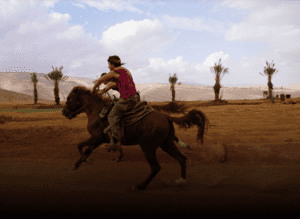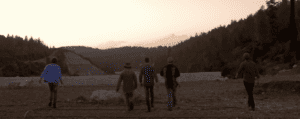credit Adi Aflalo
“And it shall come to pass, if ye shall hearken diligently unto My commandments which I command you this day, to love the Lord your God, and to serve Him with all your heart and with all your soul, that I will give the rain of your land in its season, the former rain and the latter rain, that thou mayest gather in thy corn, and thy wine, and thine oil” (Deuteronomy 11: 13-14).
In the ancient land of Israel, rain was a life and death concern. Rain meant flourishing crops, food, and life. Drought meant famine, disease, and death. Praying for rain is incorporated into Jewish daily prayer for about half of the year, and an abundance of rain in the correct season is viewed as an abundance of blessing.
The Jews of Ancient Israel made three annual trips to the Holy Temple in Jerusalem. These trips were on the festivals of Passover, Shavuot, and Succot. The last day of Succot is known as Shmini Atzeret, and it is the beginning of the season in which we pray for rain. Israel’s rainy season spans from around the end of Succot until the beginning of Passover, when we cease praying for rain, and the Jewish people would make a trip up to the Holy Temple. Now, when we no longer have the Temple, we still wait until Shmini Atzeret to pray for rain because we would like good weather while we dwell in our succahs (huts) during the holiday (Talmud, Sukkah28b).
Rain is also closely tied to the Jewish people’s’ relationship with God. As it says in the verses above in Deuteronomy, if the Jewish people listen to God and heed His commandments, He will bless them with rain. In addition, the verse says, “I will give you the rain of your land in its season.” In addition to the concerns of the travels to the Temple, the climate in Israel is very delicate, and rain in the wrong season can actually be more harmful than helpful . Some sages say that rain in the wrong season is actually a message from God that the Jewish people are doing something wrong.
Jewish people all over the world pray for rain daily for six months of the year, from the end of Succot through Passover. Although different countries have different weather patterns and different agricultural needs, Jews all over the world pray for rain for the same six months of the year. No matter where in the world, no matter the season, Jews all over the world direct their prayers toward Israel for rain. Even if they are far away, even if they never set foot in Israel, Jews all over the world pray for the wellbeing of their brothers and sisters, and that the Land of Israel should thrive and flourish.
Some people ask why God gave us a dry desert land that has no water flowing near it, like Egypt who easily gets its water from the Nile. “For the land to which you come, to possess it—it is not like the land of Egypt which you left, where you plant seed and water it with your foot like a vegetable garden. But the land to which you cross over to possess it is a land of hills and valleys; from the rain of heaven will it drink water. A land that the Lord your God seeks out; the eyes of the Lord your God are always upon it, from the beginning of the year to year’s end” (Deuteronomy 11: 10-12).
According to Rabbi Moshe Rothchild, Egypt harnessed the power of the Nile to create a very complex irrigation system. This irrigation system allowed the farmers to choose which parts of their fields they felt needed watering. God wanted us to have to pray to Him for rain, in order for us to constantly remember that everything comes from Him. We are to be dependent on Him for the rain for our crops. In Ancient Israel, the Jewish people had no source of water other than the rain from God. He waits to hear our prayers. He seeks out our connection, and the rain represents that connection to Him.




